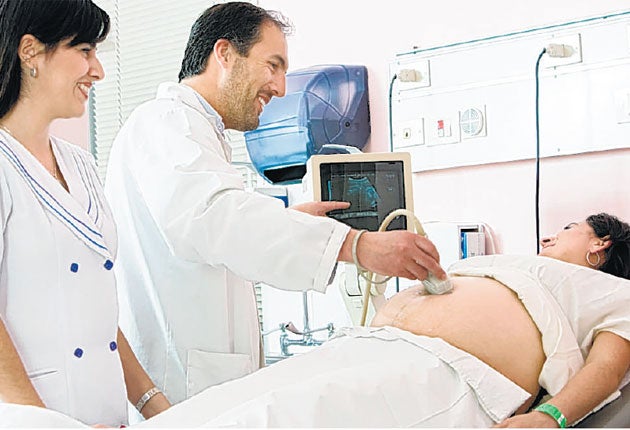Obesity epidemic is putting unborn children at risk

Health professionals are dealing with "an epidemic of obesity" among pregnant women as weight gain across the population continues to rise, experts warn today.
About half of women of childbearing age are now either overweight (with a BMI measured at 25-29.9) or obese (with a BMI of 30 or above), according to the National Institute for Health and Clinical Excellence (Nice).
The organisation today launches new public health guidance on weight management before, during and after pregnancy, in the face of concern about the risks obesity poses to mothers and babies.
Potential complications include miscarriage, pre-eclampsia, thromboembolism and maternal death. Research also suggests obese women are more likely to have an induced or longer labour, instrumental delivery or a postpartum haemorrhage.
Babies born to obese women faced significant health risks such as a greater chance of congenital abnormality, shoulder dystocia – where a baby's shoulder becomes stuck – and the potential for a baby to be too large for their gestational age, increasing the likelihood of obesity in childhood. They are also more likely to be stillborn. The guidelines outlined the importance for women in achieving a healthy weight and BMI prior to pregnancy and stressed there was no need to "eat for two".
The document, aimed at helping GPs, obstetricians, midwives, health visitors and dieticians support pregnant women, also advised against females trying to lose weight or go on a "crash diet" during pregnancy.
It stressed the need to provide women with advice on reducing their weight safely after childbirth, with information on healthy eating and exercise or a structured weight loss programme for those with a BMI of 30 or more.
Louise Silverton, the deputy general secretary of the Royal College of Midwives, said: "There is a real need to address the issue of obesity, and this draft guidance shows this is particularly important for pregnant women. The growing volume of evidence shows that the health of a mother with obesity is further compromised by the pregnancy, also impacting the health of her unborn baby.
"Midwives are ideally placed to assist women in developing healthy lifestyles during pregnancy and during the postnatal period. As a result of the increase in obesity among pregnant women, midwives are, on top of the continuing baby boom, dealing with more complex births.
"These women need to see a midwife as early as possible in their pregnancy. They need more time to spend with a midwife to help and advise them as well as involving the wider healthcare team."
Professor Lucilla Poston, director of maternal and fetal research at King's College London, said: "We have an epidemic of obesity amongst our pregnant population. At St Thomas'... there has been an exponential increase in obesity amongst our women attending antenatal clinics, such that now 40 per cent of the women are overweight or obese, and in the UK the best statistics we have suggests between 15 per cent and 20 per cent of pregnant women are coming into pregnancy with a BMI which is less than ideal."
She added that obese women were at an increased risk of "almost every complication in the book in pregnancy".
Annie Anderson, professor of food choice at the University of Dundee's Centre for Public Health Nutrition Research said: "It's estimated that, over the last 20 years, the number of women into their pregnancy in the obese category has doubled. It's going to get bigger and it's time to take stock about what to do about that."
Join our commenting forum
Join thought-provoking conversations, follow other Independent readers and see their replies
Comments
Bookmark popover
Removed from bookmarks